Why Your Autistic Loved One Can’t Find Objects Right in Front of Them
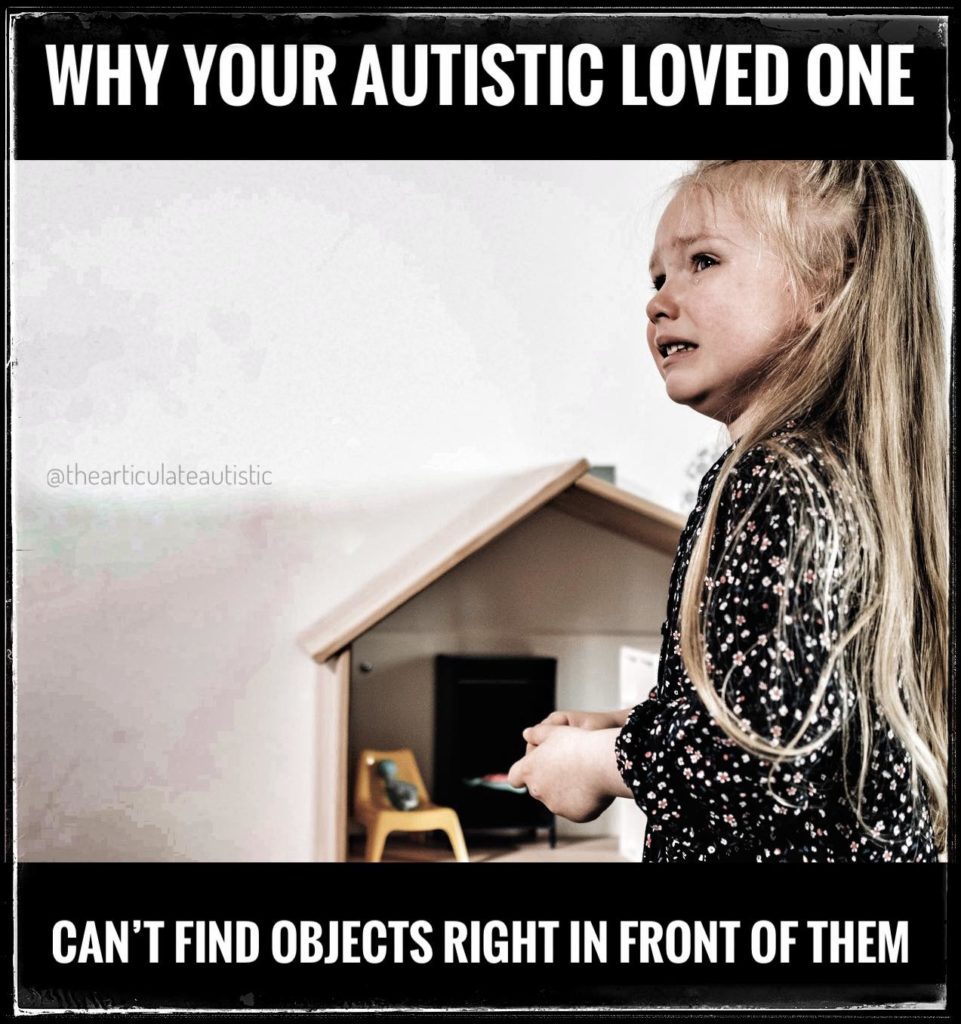
“If it were a snake, it woulda bit ya!”
I cannot find things, even if they’re right in front of me, and I’ve always been this way. Throughout my life, I would hear confusing statements like the phrase above when I couldn’t locate an object, which only made things worse.
At the time, I didn’t understand what a snake had to do with me not being able to find the orange juice in the fridge and why a relative was now holding it in front of my startled face accusing me of pretending to be confused while others looked on with sneers of disgust and barely-contained rage.
It was all just trauma to me.
Thankfully, I understand more now about why I can’t find things and how best to accommodate my needs and help others to do the same for their autistic loved ones.
Your Autistic Loved One Is Not “Faking” Their Inability to Locate Objects
I wish I could write this article without having to make this disclaimer, but even now, 30 years after my painful experiences with people simply not believing me when I said I was confused (about anything), autistic people of all ages are still subjected to disbelief, anger, accusations, and punishment on top of their very real struggles to understand and navigate a world not made for them.
Even with all the scientific and anecdotal information available about neurodivergencies such as autism, ADHD, dyspraxia, dyscalculia, dyslexia, and any other atypical brain wiring that may make us unable to as easily do what neurotypical people can do without thinking about it, we still receive unfair treatment and consequences as though our confusion is nothing more than thinly-veiled malice that must be squashed out of us swiftly and without mercy.
**Trigger Warning – Brief Mention of Child Abuse**
So, I’ll say it plainly. Your autistic loved one is not “faking” their inability to locate objects, and being accused of it is traumatic. I know this because even now, as a grown adult, if I can’t locate a requested object within a few seconds, a part of me is still half-expecting a hand to shoot out and smack me across the back of the head or a too-close mouth with sensory-overload-causing breath to scream insults and accusations at me.

My fight-or-flight still gets triggered, and I’ll either shut down or start crying. It doesn’t happen every time, but when it does, I still have to gently remind myself I’m safe and that nobody will hurt me.
That’s complex PTSD for you, and if your autistic loved one doesn’t already have it, I’d be honored if my experiences and explanations could prevent it for them.
Reasons Your Autistic Loved One May Struggle to Find Things
Now that we know your autistic loved one isn’t messing with you, let’s go over the real reasons they may struggle to find things:
- Visual Overload
Visual overload is a serious issue for me, and it may be the same with the autistic person in your life. If there are too many things on a surface, in a cabinet, etc., my mind will turn all of the individual items into what I’ve begun to affectionately call “The Amorphous Blob of OneThing”.
So, for example, if I’m looking at a cluttered desk, I don’t see the stapler, the pencil, the keyboard, the calculator, the plant, the scissors, the blotter, etc., I see a vague mass of something that has all blended into one object.
If someone says, “Hey, will you get the scissors off my desk?”, and I go into the room and see all that clutter, I’ll immediately start to panic internally because the scissors are lost amongst too much visual clutter–so I cannot pick them out as a separate, individual object I can locate, grab, and walk away with.
This means that even though my eyes will send signals to my brain that I’m looking at a bunch of individual objects, my brain will interpret those visual signals as if they are one object, hence, the “Amorphous Blog of OneThing”.
Hint: You’ll instantly increase my odds of finding the object by 50% if you tell me what color it is.
- Vague Instructions
“Hey, will you get the scissors off my desk?” isn’t too vague for most neurotypical (non-autistic) people, but neurodivergent people often need more information in order to form a cohesive picture in their head of what object they’re supposed to be looking for. Giving more information also helps with solidifying a request in a person’s brain if they, like me, also struggle with working memory and short-term memory.
- Direction Confusion
Some autistic people struggle with their sense of direction, so if your instructions include telling them to go right, and they take a left, they’re not messing with you, they’re genuinely trying to do what you’re telling them, but they’re confused about which way is which.
- Out of Sight, Out of Mind
As an autistic person who also has ADHD, I struggle mightily with object permanence. If something is in a drawer I don’t open often, for example, it essentially “disappears”. If that’s the case with your neurodivergent loved one, you may ask for the object but leave out where the object is located because you believe they know or remember that. They may not.
How to Support Your Autistic Loved One in Locating Objects
Now you know why your autistic loved one is struggling to locate objects, so how can you support them?
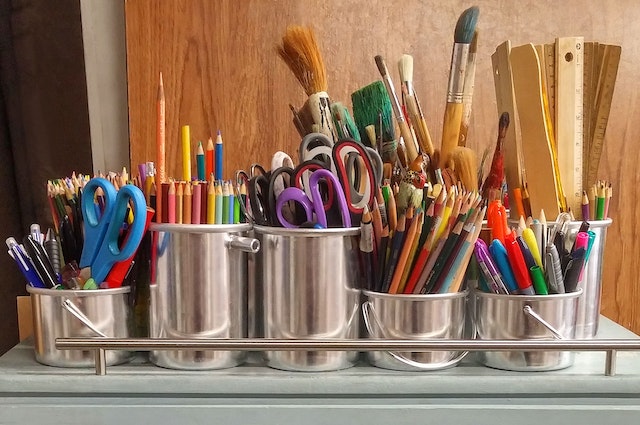
Here are a few suggestions:
- Be More Specific
As I mentioned above, the kind of instructions a neurotypical person would need to find something may be too vague for an autistic person. That’s why it’s important to be specific when making your request.
Say something like, “Hey, there are a pair of scissors on my desk in the front office. They have a red handle, and they’re in the black cup on the right-hand side of the desk right by the computer monitor. Will you get those for me?”*
*Note on literal thinking: When you think of a cup used to hold pens and other small office items, you probably picture an object that looks kind of like a small wastebasket with an open metal weave. However, if your autistic loved one has never seen anything called a “cup” that one didn’t drink out of, they may look for a literal drinking cup or mug, and the open-weave metal basket your scissors are sitting in will not register at all. This can cause confusion, frustration, panic, and even feeling like they are being purposefully gaslit depending on their trauma history.
- Use the GPS Method
For younger individuals and/or those who struggle with working memory and short-term memory, use what I call the GPS Method. Give turn-by-turn directions like a GPS, so they can carry out your request, literally, one step at a time.
For example:
“Walk down the hall towards the front door.”
“Walk into the office on the left.”
“Walk up to the computer desk.”
“You’ll see a lot of stuff on the computer desk. It’s OK. I just need the scissors.”*
*Reassurance is important for those who become overwhelmed by visual clutter and/or have a history of being yelled at or punished for not being able to find things.
“On the right-hand side of the desk, you’ll see a black cup with pens in it. The red-handled scissors should be in there.”
For many autistic people, the more details, the better.
- Have a Designated Place for Things
You can also reduce confusion, clutter, and frustration by having a designated place for commonly-used objects. Knowing exactly where an object is located can also bring feelings of confidence, calm, and order to the neurodivergent brain, especially if the person who owns said brain has experienced trauma.
- Use Visual Supports
Visual supports are another way to accommodate your autistic loved one’s need for specific, concrete instructions and clear expectations. If “out of sight, out of mind” is a common struggle in your household or classroom, taking a picture of what’s in the drawer or cabinet and taping that picture to the front of the drawer or cabinet can improve confidence and reduce frustrated and panicked searching.
The Takeaway
Not being able to find objects that are supposed to be in plain sight is not only frustrating for you but also for your autistic loved one. Believing in their experience, understanding their point of view, and offering accommodations can go a long way in reducing overwhelm while increasing confidence and independence.
It’s also important to note that there may be many times when this approach is new to want to just “get it yourself”, especially if the autistic person in your life is a child, but remember, the goal should be to empower them and guide them towards independence–even if you need to take the long way around.
Download PDF of this article on Patreon.
Need some personalized help? I now offer private consultations!

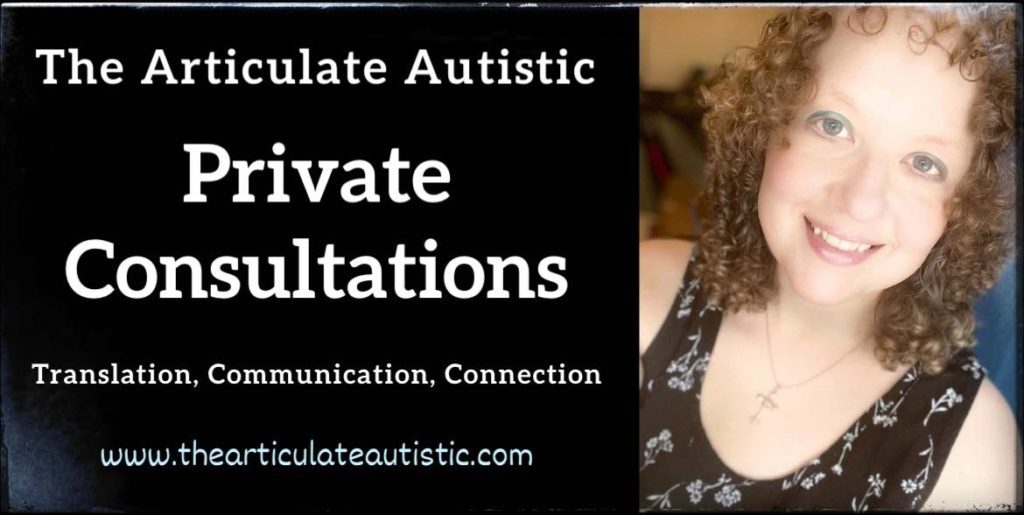

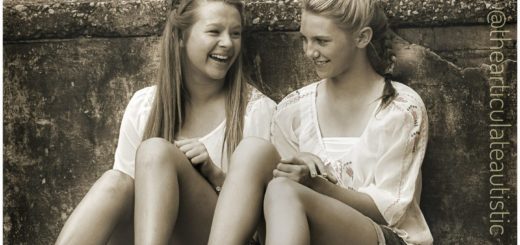
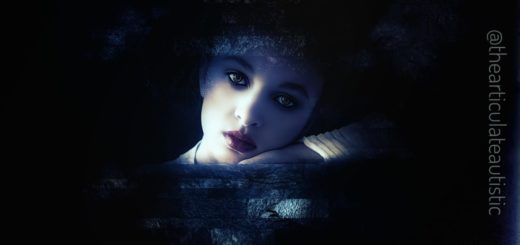

Hi
Thank you so much for this article. It’s very much true. I can know, being a recently diagnosed autistic person. Especialy the *trigger* part: all the time I thought I was ‘being a baby’ but what you described feels so real… The never ending fear, like a shadow hanging over you! Also your other articles speak to the heart. Thank you so much!
Kind regards.
I’m so glad it resonates! Thank you for your comment. 🙂
Always thought that the tv was the effect of my son not seeing this when they were right under his nose when the tv was on. But then, in the morning, he seems not to see his school shoes even when they are staring at him
No, it’s not the TV. It’s visual overload, and your son really is struggling. He’s not making it up or distracted. He literally cannot see his shoes, visually he can see them, but his brain isn’t translating the sensory information into something meaningful, which is why he can’t just pick them out. Please never punish or admonish him for this, but help him find his shoes (or whatever else is “missing” for him). It’s very distressing when everyone is screaming at you that something is “RIGHT THERE”, but you cannot see it, and you just keep panicking and thinking you’re losing your mind–or that people are messing with your head.
Another pebble on the pile of clues that I’m neurodivergent…I’m notorious with my loved ones and coworkers for being unable to locate the most obvious crap. I’ve learned to warn people, immediately and repeatedly, that they should never ask me to look for something, because I won’t find it. My last boss got so mad when he bought something I thought we didn’t have and then he found two gallons of it, right where it should have been. I feel vindicated by this. Thank you for explaining.
This resonated with me so much! I used to get very anxious at school or work when I couldn’t find something right away – especially if the instructing person was watching me search.
I had an experience the other day where I was searching through a shelf of dried herb containers for ginger and couldn’t find it for love nor money! Someone else went after I had concluded that there was no ginger and found it instantly, which gave me that feeling you mentioned of feeling like you are being gaslit.
I am mildly autistic, but had never made the association. Your article has encouraged me to relax and put less pressure on myself. Thank you!
I’m literally the worst mother in the world right now. I’m so guilty of raising my voice when my neurodivergent child can’t find objects right in front of him. 😭💔
You’re not, Nicole. You didn’t know. Now you do. You’d be amazed at how helpful it is that not only do you know now, but you’re willing to make changes to how you respond in the future. That’s the sign of a GOOD mother 🙂